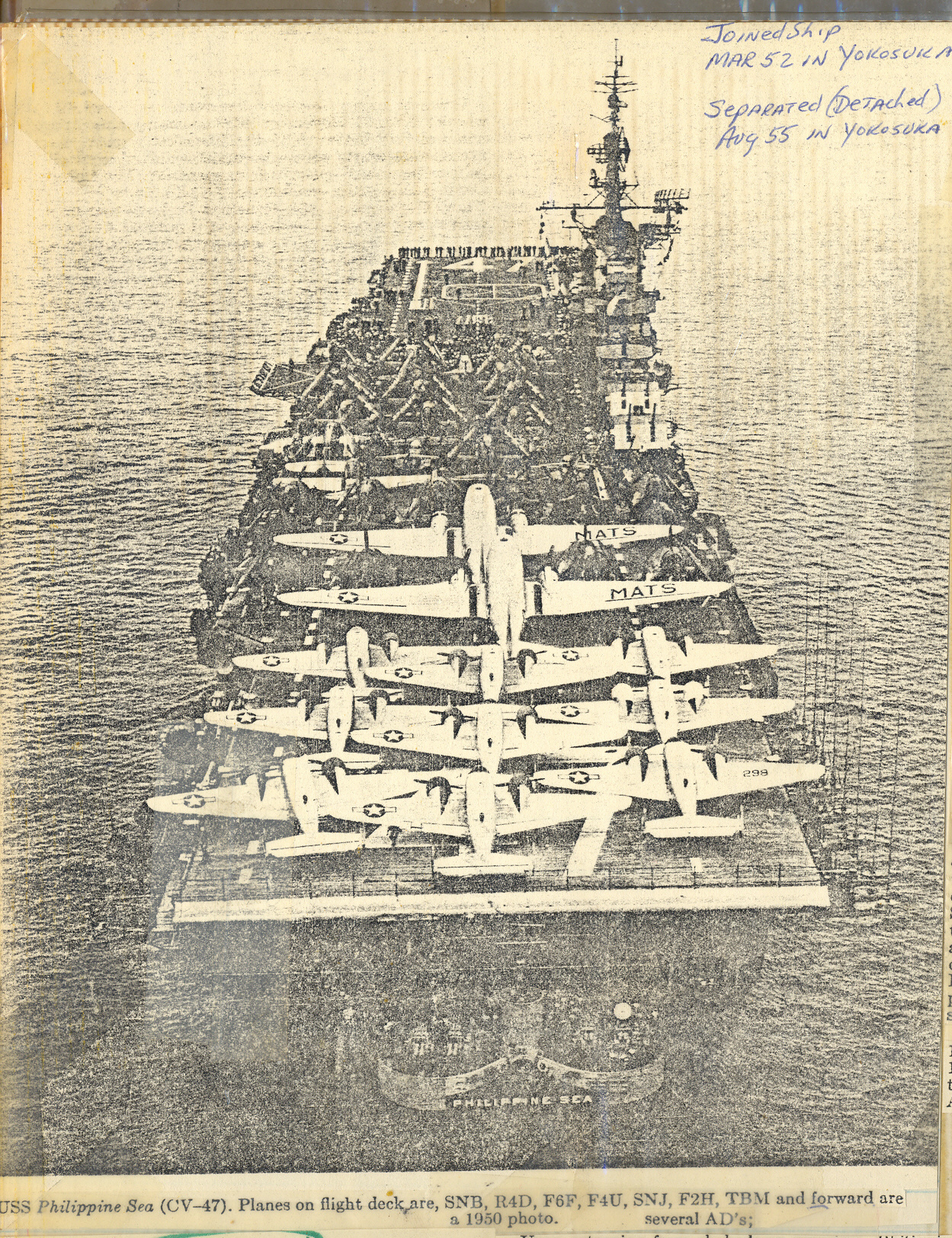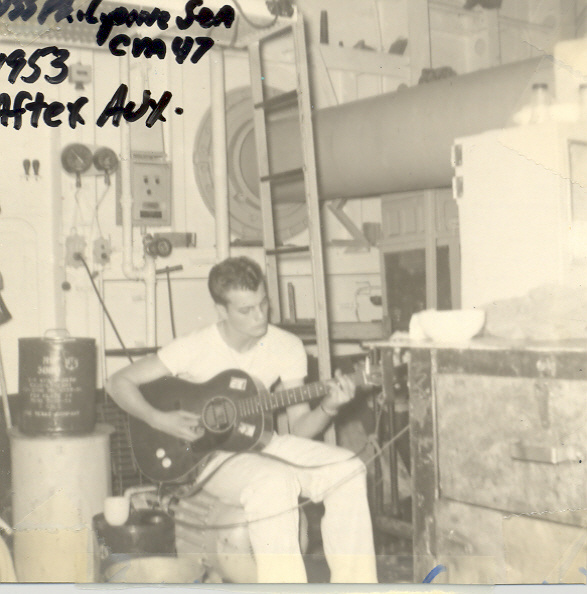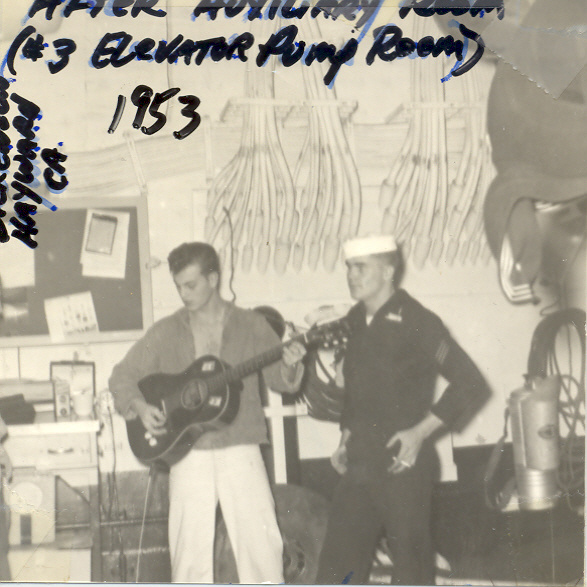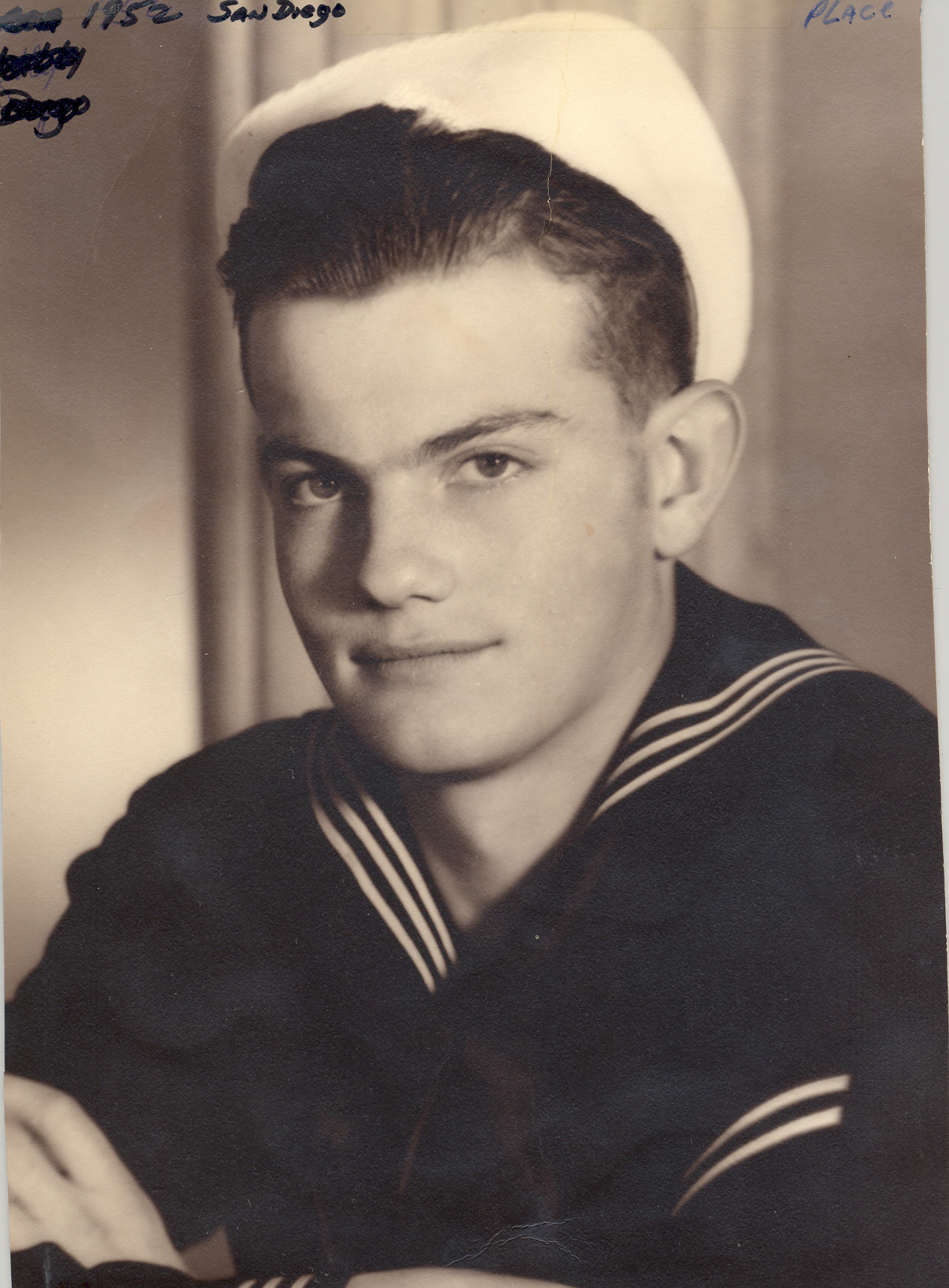TRANSCRIPTION
Where did you attend high school?
Greenville, Illinois...there were a lot of traveling in between. There was couple of foster homes, three that I know of due to divorce and separation. My mother took us to Minnesota, but she couldn't keep us or support us. The state was paying the tab. I was three years old when my parents split up, they didn't get divorced. I don't think they were ever married. My mother hada three children each by different fathers...was married to the first one, my sister, I think I don't know. Anyway, they split up at three. I did first and second grade out of Mitchell on a farm in South Dakota. I also lived with my aunt and uncle. They lived outside of Laverne, Minnesota on a farm. I did third grade there. They didn't have electricity or toilets back at the farm, this was in the 30's. I can remember when the REA (Rural Electrification Administration) brought in wires and they were stringing wires...but before they decided they would like to have electric lights, they drilled a hole through the ceiling, drop the power cord, and put a socket on it. That was the electric light. That was powered by a bank of batteries, which was upstairs in my bedroom, unfortunately, because the regulators to keep the batteries from overcharging would click, click click, all night and I was little afraid of it. Then they put a windmill charger on top of the smoke house, smoke house is where they smoked the meat when they slaughter each fall. The windmill charger kept the batteries charged and this light bulb was their electric light.
After the foster homes, what did you do?
I went back to dad and mother in Illinois and that lasted through the part of fourth grade in a little town called Pocahontas, it was nine miles west of Greenville. They split up again and he went to work in a different town. Then she moved to that town and I lived with her and it was very poor living, we were poor, dad was taking care of all the kids, my mother came back from California with another one, that's my younger brother. She beat me so hard, I had black and blue bruises all over. The law got involved and I went to live with my dad. I was just starting high school, that was probably the best three years of my life. We had a room in a house, a private residence and he got a hot plate, he thought maybe I would do some cooking, fourteen year old boys don't do cooking (he laughs). So he set me up a charge account in one of the restaurants he knew where I'd eat. Three years, then the Navy. He told me three things when I went to live with him, he said don't lie to him, be home at nine each night, and don't leave town unless I told him that I was gonna leave.
What were you doing before you joined the Navy?
I was killing chickens...let me tell you, they use a knife, very, very thin blade, the chickens are snapped into a rack with there legs hanging upside down five in a rack. There's a guy down below, he's taking them out of crates and snapping them in and they come up on a conveyer belt and you snatch them off and hang them here wearing a leather apron and boots, cause coagulated blood gets pretty thick by the end of the day. You get hold of chickens head, put the knife in between the neck bone and the vein and pheww (he makes this sound), that's it! That was my job...I don't remember what I got paid, seventy five cents an hour maybe, pretty good pay for a kid. Also, I set pins at bowling alley, caddied at the golf course, mowed lawns, and delivered newspapers.
We were talking about pin setting in class and how there are no more jobs like that now days...
Used to set one alley and this guy that I worked with could set two alleys and he could keep track pretty much of whether you're suppose to drop a rack or not, depending on who did what. So one night, I told the manager that I would like to set two alleys; she said okay, I set them but not again! Damn near killed me (he laughs). Then I got a paint chip in my eye, but the insurance paid for that for the doctor to take it out. It was a chip off the bowling pin.
So you saw a doctor back then?
Oh yeah, the insurance at the bowling alley paid for that. They sent me to the doctor.
Before that, did you ever go to the doctors?
Interesting you should ask, I said my mother was worse than the others? She bent my arm back so far that my wrist was sticking out here, yeah I saw a doctor for that. Wound up in a sling and she said you tell them you did that on a hand walker because if they found out otherwise, there would be some other bad things happen to you. Oh I think I saw a doctor twice, I had ringworm somewhere on my tummy and they used x-rays in those days. This was probably 1939 and I jumped over a manger in the barn and stepped on a nail, it went almost all the way through my foot. I don't remember is I saw a doctor for that or not.
They looked for the ring worm with an x-ray?
No, they killed it with an x-ray. See they didn't know that too much x-ray was harmful to you and they lined up whatever they lined up and used the x-ray machine to kill the ring worm. I have a scar on my left side and I wondered all my life where I got that scar...hmmm, that could be where I got it from, an x-ray burn. Here I am seventy two and I just figured it out....hot dog (he laughs).
Why did you choose to join the Navy?
The recruiter called me on a Friday and he said I just noticed that you're not seventeen until Monday so you'll have to wait till Monday. I was happy with dad for a kid, I was very immature, empty headed, nobody taught me anything. I don't know what the attraction of the Navy was, but I wanted to go, and the day I turned seventeen I was gone.
So you don't remember why you chose to go into the Navy?
It was probably a macho image of the uniform from the recruiting billboard. The Navy guy gets the girl, that would be my guess.
Where did you go to basic training?
San Diego, California at the US Naval Training Center. The first three weeks we were quarantined by sending us outside of San Diego to a training area, I can't remember the exact name of it. If you had any infectious contagious diseases, it would show up within those three weeks and after that you would start your training right away which was in San Diego right by the water front.
 Were you sent off right away or stationed somewhere else?
Were you sent off right away or stationed somewhere else?
Oh I was sent, because the Korean War was already on. Christmas vacation came up and they were granting our group Chistmas leave, if they wanted it. I didn't want it because I didn't have anything to go back home to anyway. I went on a troop ship, went to Japan and caught my ship at Japan. I spent three and a half years on an aircraft carrier.
What is a troop ship?
It's a ship, it bunks four tiers high and its all you got. There's so many damn men, there ain't no place to stand during the day time. It just carries troops. I'll tell you a story there about what good of a sailor I was. When we left San Franciso going under the Golden Gate bridge, they had these wells called ground sweels, I was sea sick. I went for the head (toilet) and all the urinals and all the stools, people were puking down there. One fellow was even heaving down the drain where you wash down the head. There was no place for me, so I went back up and heaved into the wind (that shows what kind of sailor I was) and it came back, I ducked and it hit the guy next to me. He wanted to fight, but he was too sick to fight.
Were you scared about going to war?
I didn't have enough sense to be scared at that age. When you look back in your fifties and sixties, the things you did back in your twenties and thirties, you wondered how you did them. But at that time you just go ahead and do it. You're not really concerned about it. I was in the Navy and I was on a ship, ships and airplanes, did lot of bombing and strafing, almost round the clock air ops. You work a regular duty day and stand watch at night. It may be six hours then you get four or five hours of sleep. This went on and on as long as you were out at sea. The closest I came to getting hurt could have been a ship board accident, they wouldn't let you on the flight deck unless you belong there, cause they were doing flight operations. They had people killed cause the propellers took off body parts especially the head, the top of the head. The tips of propellers were painted yellow and you'll see a yellow circle when the plane is running. Helicopters were just coming into use and they were used only as pickup if you ditched at sea and close enough to one of the ships, the helicopter would get the pilot. The reason why I say this is because I have a very vivid memory of a pilot that got his craft back, he and his gunner were both shot up and one of them died and they put him in a refrigerator or the freezer. I was on KP (kitchen patrol) at the time and breaking out food and they were bringing out this body on a stretcher. They were going to take it up, we were close enough to Japan and they were gonna fly it. It was either chilled or frozen, I don't know which but if they had anybody on ship that died, that's how they handled it till they can get it to Japan to a mortuary.
They froze them in a freezer?
Either froze them or chilled in a refrigerator, a big walk in refrigerator.
Where you had your foods?
Oh yes, we didn't eat them though (laughing). They were off to the side, this was a war time situation and we needed a place to put them, so that's where we'd put them.
Did you know anything about Korean War?
No very little, I had only heard of Korea.
Did you even know where it was on the map?
No, probably not. I knew the country had been invaded but that's all. As far as politics, I didn't know anything about politics. The only thing I kew about communism was probably next to nothing. I don't remember being taught anything about it in high school. I didn't even graduate high school and at that time, you didn't need it to join the military. I did get my GED later on.
Where were you at Japan? Were you between Japan and Korea at sea?
See, the ship was an aircraft carrier, we carried ninety plus airplanes. It was in port in Yokosuka, Japan. That was your overseas home port for replenishment. When you replenish, that means working parties (which means carrying food). I had my share of those, I got so tired of carrying boxes, I couldn't hold my arms up. Also ammunitions, they would bring bombs over with a sling hoist from the dock on shore to the ship.

 What was your main duty on the ship?
What was your main duty on the ship?
I was a machinist maiden which primarily takes care of the engine room machinery.
What was your typical day like on the ship? did you have any chance to have fun or some down time?
Recreation was really the library. Very small library. I learned to play guitar on the ship. I bought one in Japan and learned to play. In fact, later I bought a real good one. A guy was short money and I picked up one for half price which was retail over a thousand now maybe more. And I sat in one time with the ships band, people that played and they didn't want me and I was very disappointed. I knew the songs; they never did give me a good explanation of why they didn't want me. But, I had that thrill of playing with them that one night. There really wasn't anything except for the library and whatever else you can do. I learned how to play cribbage that was a pretty common thing. I don't remember now.

 Did you ever land in Korea or have any dealings with the Korean people?
Did you ever land in Korea or have any dealings with the Korean people?
Not in the Navy.
The war ended when?
In 1953, I can tell you exactly where I was. I was standing in a berthing compartment when the news came over the bitch box, a loud speaker, that the armistice had just been signed. I remember that very well. I wondered what's next.
 So the whole time during the war, you were on the ship or docked?
So the whole time during the war, you were on the ship or docked?
Oh yeah, you would stay out maybe, I'm guessing now, I think thirty days cause you had to go back and replenish food, ammunition, medical supplies, whatever. You would have liberty, you'd be there for...actually your stay in port was dictated by the amount of work that the yard or yard workers, not that you were in the yard, but the workers had to do on your machinery. Once that was caught up, you loaded stores (food) and ammunition then you were gone. You could be in there for ten days or two weeks and that was liberty time.
Did you walk around Japan?
If I had any money, of course. The only thing I didn't like about it was I didn't have enough money to do what I wanted to do (laughs). Drink beer and chase the girls.
 By the way, what ship were you on?
By the way, what ship were you on?
USS Philippine Sea (CVA 47). The ship's almost 1000 feet.
 When you got out of the Navy, how did you adjust?
When you got out of the Navy, how did you adjust?
I never did. So I went back in the Navy within the ninety day period. This led to twenty years in the Navy and Army combined.

